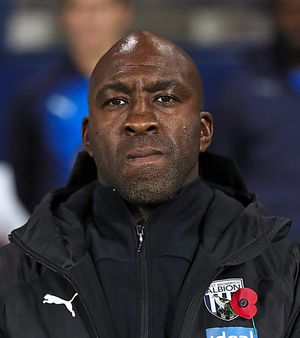Comment: Darren Moore’s long-term vision should be built from solid base
As the afterglow of the Leeds result begins to fade, thoughts inevitably turn to the way forward for this Albion side.

Darren Moore beat Marcelo Bielsa’s men by changing both his formation and style of play.
The 3-4-1-2 was ditched in favour of a more resolute 4-3-3 and instead of passing it around the back, Albion got the ball forward quickly to Hal Robson-Kanu and countered at speed.
It delivered the team’s most complete performance of the season and a statement victory over the side that has spent the longest at the top of this unpredictable division.
Since then, Moore has refused to commit himself to this approach, insisting he will adapt depending on the opposition.
Any return to the previous system would give sweaty palms to defenders and fans alike, because it felt like a corner had been turned against Leeds.
But Moore’s words should be taken with a pinch of salt, because it is exactly what he has said throughout his short tenure, and exactly what he said when he was persisting with the 3-4-1-2.
“I’m not saying anything different here now, that I wasn’t saying back in June, July, and August,” said the head coach, and he’s right.
It’s worth pointing out the victory over Leeds was not a complete polar opposite to what has gone before.
As the game wore on, Albion became more confident in possession and started to pass the ball around.
The startling statistic from the game was that the Baggies had just 28 per cent possession. But the way possession is calculated has to be taken into account.
Rather than how much time is spent on the ball, Opta now calculate possession on the number of passes each team makes.
One of the striking aspects of the performance against Leeds was the direct running and dribbling from deep of Matt Phillips, which was incredibly effective but wouldn’t make a huge impact on possession numbers.
There were no passes, for example, involved in his goal. There was just one involved in Harvey Barnes’s.
Jay Rodriguez and Barnes were also running with the ball, and Hal Robson-Kanu spent a lot of time holding it up.
So the reason the 28 per cent statistic felt low to those who were at The Hawthorns is probably because it was low, an unfair reflection of the game. Albion had much more control than that paltry figure suggests.

Moore’s attempts to change Albion’s philosophy in the first dozen games of the season were admirable, and for a while, it worked.
“We played a formation that caught the league on the hop, for the first few games it caught everybody out,” he said.
But as teams wised up to it, confidence dipped and he was forced into a change.
His long-term vision may still be something akin to the previous approach, but the way Albion’s players reacted to the change should make his mind up for him.
They looked far more comfortable and confident against Leeds. They believed in their instructions and carried them out perfectly.
Friday’s trip to bottom-side Ipswich Town will be a completely different test.
Albion will be expected to be on the front foot, they may naturally be the side probing. This time, it could be them vulnerable on the break.
But the Baggies stood resolute against Leeds and that same back four must be kept, regardless of the opposition.
In fairness to Moore, the Holy Grail he appears to be chasing is competence in both systems.
Mastering a number of formations and approaches will give the Baggies the best chance of finding ways to overcome a myriad of opponents. “We chop and change accordingly,” he said.
His ball-playing philosophy may be admirable, but there’s an argument this group of players wasn’t completely ready for it.
A return to physicality and functionality focused on breathless breakaways suits a group moulded in the image of Tony Pulis.
And then, as time wears on, and this team get more used to having the ball, or players are bought in that image, they can improve their ability to play possession-based football.
But the crucial things is now that learning can now come from a base of comfort, rather than one built on shredded nerves.
“There’s going to be transition in this club,” said Moore. “That transition takes hard work and time, there’s no short cut, there’s no quick formula with this.”
It appears the end-goal remains the same, a team with a pure footballing philosophy capable of producing results with it.
But for the time being, Moore and his coaching staff have found a compromise worth pursuing.





